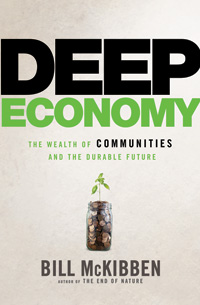Local Thoughts
A couple of things I did this week got me to thinking a bit about how much plain old ordinary folks have to offer.
Monday evening I went to hear Wangari Maathai speak about the Greenbelt Movement, a now international movement to reforest central Africa. Dr. Maathai spoke about how she moved from a scientific study of the effects of ticks on cattle to a commonsense study of Kenyan women, their needs, and trees. The short of it is that she listened to and worked with these women to figure out how to heal their land through reforestation so that they themselves could be healthy.
She told many stories of how conventional science and forestry were trumped by the local knowledge and hard work of individual women.
Tonight, I went to see the film "Broken Limbs," which tells the stories of apple farmers in the Wenatchee Valley of central Washington. The film was sponsored by Farms Without Harm and the Greater Grand Rapids Food Systems Council.
The film explored the impacts of globalization and the current consumer-driven, industrial-scale food system on the livelihood of apple farmers. Not all doom and gloom, the film wrapped up by sharing the stories of some farmers who discovered how to operate in the face of such a seemingly all-powerful system. It also spoke of the non-farming folk that are an important part of the equation.
After the film, a man got up and spoke about his work as a local farmer. He spewed a bunch of half-baked philosophy about the "fundamental" solutions to health and the environment. But where his talk was as holey as Swiss cheese, his actions are to be admired. This farmer, along with some others, has made the connection between the food he grows and the health system that spends so much time fixing people who have been broken by the deficiencies of the dominant American food system and culture. Along with his peers at the Sweetwater Farmers Market, he has persuaded a local hospital to make the connection between food and health and to be an active partner in promoting the sale and consumption of local produce in their building lobby twice a month.
Lastly, when I came home tonight, I read an article online that was in last Sunday's New York Times Magazine. "Unhappy Meals" is written by Michael Pollan, the same guy that wrote "The Omnivore's Dilemma." In the article, Mr. Pollan wisely suggests that a commonsense approach to eating will probably make us all healthier. He explains in quite some detail how putting food under the microscope has caused us to focus too often on the wrong things for the wrong reasons.
In the end, he offers nine suggestions for how people can eat better; and not just for their own health, but for the health of those around them and the world at large. Pollan suggests:
1. Eat food.Each story got me thinking about how, one-by-one, it is our own small actions that can collectively lead to large scale change. Might this not be a good year to plant a native tree? Buy only local apples? Make it a habit to support your local farmers? Eat food...like a French omnivore?
2. Avoid even those food products that come bearing health claims.
3. Especially avoid food products containing ingredients that are a) unfamiliar, b) unpronounceable c) more than five in number — or that contain high-fructose corn syrup.
4. Get out of the supermarket whenever possible.
5. Pay more, eat less.
6. Eat mostly plants, especially leaves.
7. Eat more like the French. Or the Japanese. Or the Italians. Or the Greeks.
8. Cook. And if you can, plant a garden.
9. Eat like an omnivore. Try to add new species, not just new foods, to your diet.





















No comments:
Post a Comment